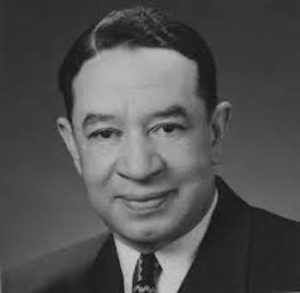
Jesse E. Wilkins Sr.
*Jesse Wilkins Sr. was born on this date in 1894. He was a Black lawyer and labor activist leader.
Jesse Ernest Wilkins Sr. was born into a working-class family in Farmington, Missouri. After serving and experiencing racial discrimination as a soldier in the First World War, Wilkins studied mathematics at the University of Illinois and then attended the University of Chicago Law School in the 1920s, becoming one of its first Black graduates. He graduated with a Ph.D. at age 20, was a member of its Phi Beta Kappa Society, and then practiced law locally for several years.
In 1922, Wilkins married Lucille Robinson, who taught school in Chicago, was secretary to the women's division of the Methodist Church, and also practiced law with her husband for 33 years. In 1953, Wilkins became the first Black to serve on the nine-member Judicial Council of the Methodist Church when he was elected its secretary. The body is Methodism's nominal and administrative head.
Wilkins was a member of Eisenhower's President's Committee on Governmental Employment Policy (PCGEP) board when he was with the Labor Department. In 1954, President Dwight D. Eisenhower appointed Wilkins as Undersecretary of Labor for International Labor Affairs, becoming the first Black to attend White House cabinet-level meetings in the absence of his superior, Labor Secretary James Mitchell. Wilkins had previously served the Eisenhower administration as acting chairman of the President's Committee on Government Contracts.
Until 1957, Wilkins was a U.S. representative on the governing body of the International Labor Organization. During his tenure with the administration, he was a member of the Equality Committee, working with Frederic Morrow, Val Washington, Joseph Douglas, James Nabrit Jr., and Samuel Pierce. While investigating charges that Black voting rights had been violated, his work with the six-member Civil Rights Commission was hampered in Montgomery, Alabama, when he was refused accommodation at the hotel where the other commission members were staying. He subsequently found a room for himself at Maxwell Air Force Base. When the commission tried to subpoena county voting records, they discovered that then-Circuit Judge George Wallace had seized the documents and was threatened to jail any commission member who would interfere in his jurisdiction.
After a public falling-out with the president over this, Wilkins was dismissed from his post by Eisenhower and then went on to join the U.S. Civil Rights Commission in 1958. During a later election campaign, John F. Kennedy quickly noted that when Wilkins was fired, he was replaced by the son of one of the Republican Party's outspoken anti-civil rights advocates. His son, Jesse Wilkins Jr., was a proficient Mathematician and teacher. In 1959, Wilkins also became the first Black president of the Judicial Council of the Methodist Church. Jesse Wilkins Sr. died on January 19, 1959.